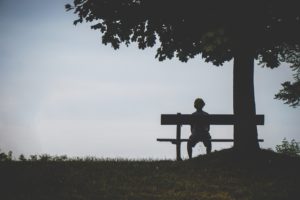Unless you’ve been on your boat in the south pacific with no internet (or on a silent meditation retreat like Jared Leto), you already know that some nasty virus (Coronavirus, COVID-19) leapt from an animal to a human sometime last year and now we have a pandemic.

The earliest known case is that of a 55-year-old from Hubei province in China who may have contracted COVID-19 way back in November of 2019 (South Morning China Post) which is more than a month earlier than the cases in Wuhan, China at the end of December 2019. Regardless of when it first hit, it’s here now and our local, state and federal governments, after weeks of downplaying it, have finally started efforts to test, contain and mitigate it.
Vulnerable populations like the immune-compromised and the elderly have been the focus of protection efforts since COVID-19 can quickly and significantly compromise their health and lead to death quickly. But my focus is college students and how, though physically in their prime, may be most vulnerable from a psychological perspective.
Many of the steps and recommendations for containment of COVID-19 are directly impacting college students almost like kryptonite. Recommending social isolation, washing your hands and taking responsibility for online classes? That’s a heavy lift even for the super-students out there. What about those planning to graduate in May or June and have jobs lined-up? This can be an especially confusing and stressful time and since we haven’t experienced anything like this in over 100 years (looking at you Spanish Flu), are a tad ill-prepared for what it will take to support students. Though hastily thrown together (I’ll have plenty of time over the next few weeks to edit this) I think this is a pretty comprehensive list of what college students and their families should be considering.
Fundamentals
Let’s start with some basics that every responsible human should be doing and aware of directly (with some needed personality added in) from the Center for Disease Control and the World Health Organization. First, take this disease seriously. No! It’s not like a cold or flu.
Next, wash your hands. If you’ve been one of the lucky ones and have hand sanitizer, keep it stashed in a pocket and use it after every outing and interaction.
Next, don’t socialize! No parties, no travel, no restaurants. Just a bad idea which will likely help spread the virus rather than contain it. It’s unlikely college students will have significant health problems from catching it. The real problem is when they spread it to others. Researchers still are not sure how it spreads but do know direct contact is one way.
Finally, please understand that most researchers agree we are very early on in this pandemic with federal health officials speculating it could peak in May 2020 though the effects could impact healthcare, education and the economy for years. In the last 24 hours, experts are now stating this pandemic could last for over 18 months (that’s through into early 2021).
Education
Public schools are shut down. If they have not shut down in your area, they likely will. Same with colleges and universities. If they have not moved to virtual or online classes, they will. Administrators are still figuring out how this will impact graduating students, students that needed an internship, and those students who might lose out on credits. Basically, they were forced into a ‘Ready, Fire, Aim!’ situation.

Recommendation: Email your son’s or daughter’s academic advisor a list of specific questions related to the points I just made. This will provide you with specific information not necessarily listed on the school’s site and at least give you some peace of mind you’re doing everything in your power to control the situation.
Focus
Sometimes, when a relationship ends or we move from college to a new city, we can easily feel disoriented and lose our rhythm. How about a pandemic which has a seemingly slow build-up and mostly resides on cable news at this point? Empty grocery stores and closed bars and restaurants. At first it may have the feel of a preemptive snow day where the snow never came but everything shut down. But then a new reality begins after days and days of the world being more and more…different. It’s at this point that the first casualty is evident. We lose focus. Our patterns and schedules forgotten, replaced with impulse since we are suddenly…time-rich and oversight-poor.
Recommendation: Specifically for college students, get a daily schedule mapped out for at least the next week (yes, starting today). It may not be fair but your son or daughter is getting a crash course in personal responsibility and adaptability. The students (and adults) that adapt to the next few months with integrity, self-discipline, and planning will be the big winners as society settles into a new paradigm of vulnerability and economic upheaval.
Social Isolation
We are all being encouraged to isolate from friends, family and the general community. It’s a vital part of containing the spread of the virus. For college students, this is a big request since they are in the prime of wanting and needing that social contact.

Social isolation can also feel strange since you can walk in the park and do regular activities and nothing about the physical environment seems any different. Like my example above of the classic snow day where everything is shut down and we feel cabin-feverish, which at least makes sense to feel so cut off since there is, well, too much snow.
Recommendation: If ever there was an argument to be made for the value of social media and, specifically, Skype and FaceTime, this is it. I’m encouraging all my clients to intentionally reach out to friends (and family) not only on a group text but also set up a time to FaceTime for a few minutes. While nothing can adequately replace in-person meetings, FaceTime/Skype at least allows us some visual contact. It also forces us to at least look like we’re taking care of ourselves.
Another suggestion is to get outside as often as possible unless you are in a crowded (unlikely at this point) city. Research shows that even just seeing others or our outside world can help when we feel isolated.
Depression
I expect this to be a big problem and here’s why – we are telling college students a) to stay away from friends, b) to not go to school, and c) we have no idea when any of this will go back to normal.
It is almost a specific recipe for creating depression. There is only so much Netflix, snapchat and online school work a kid can do before they start rotting from the inside out. The lack of physical contact is going to be another big problem. Kids hook up at parties. Frat parties and events are as physical as they are social. All of this changed in a matter of days. Gone. Your college student is at real risk of losing motivation, feeling down and hopeless. There really is no way of knowing what the next few months will look like.
Recommendation: Now…like right now, if your son or daughter was working with a therapist, email or call them and make contact. Find out if they are still working with clients and if they are willing to do phone/Skype/FaceTime. If so, get something scheduled for a week out so that if signs of depression creep in (or creep back in for those with a history of it) you will not need to compete for the limited spots all of us professionals are going to have in the coming months. Next, get your kiddo on a schedule, including a regular sleep schedule, working out and attending to school work if their virtual/online classes are not meeting at a specific time. Finally, encourage them to keep in contact with friends and family, specifically with FaceTime or Skype.
Anxiety
This is also another issue that’s likely to rise in students and can be really scary for parents who haven’t dealt with it before. When we feel confined and isolated, our brain has a difficult time with chronic containment. The fastest way to make a sane person insane is to put them in total isolation – think of Tom Hanks on the island talking to a volleyball (Wilson!). Our brain craves social interaction and all the little seemingly invisible problems and struggles a typical day out in the world provides. What happens when we are all tele-commuting? Our brain starts freaking out and the perceived threat in the environment is no longer that frat brothers are making fun of us or that group presentation next Monday. The new threat which is bizarre and disorienting is isolation.
Recommendation: All the suggestions for depression apply here but with a few others. I recommend that all students engage in some type of practice that gets them out of their minds for at least 30 minutes each day – yoga, meditation, reading, golf, etc. Something where our fight or flight response is dialed-down. There are a bazillion apps and YouTube channels with free options. Use them. Use them now and get a practice going before isolation becomes a bigger problem.
Substance Use
People bought items in this order – sanitizer, toilet paper, … alcohol.

If we’re not careful, our regular use of alcohol or weed or pills can become a big replacement behavior as boredom, isolation and hopelessness slowly slither their way into our lives.
It feels like vacation right now but as days turn into weeks, our vacation-patterns will become our lifestyle. Having a drink on a beach in the middle of the day is great. Woo-whoo!
Having a drink in my home office in the middle of the day, every day, is terrible. It’s depressing. Unhealthy, unchecked lifestyle is short-term stimulation at the cost of long-term satisfaction. Smoking weed a few times at night might be fun for college students while at school but once home for weeks it can become habitual – disrupting sleep, eating and increasing anxiety.
Recommendation: Kids are going to party. I get it. But there’s no reason parents can’t set some reasonable boundaries around when and how often. Let me be more specific – kids will want to smoke weed (yes, even your little angel) and drink and vape (stupid, really really stupid). This is a reality. You can try to tell them to stop or don’t use anything but that will only drive them to hide it which will get pretty difficult after a few weeks at home. Instead, talk about ‘reasonable’ use. What a great time to act like one of those adults responsible for things like houses, kids and adulty-type stuff. They may not have those yet but it’s a perfect time to start practicing. It may not feel fair to your little angel that they’re stuck at home and can’t go back to school but since this is the reality for at least the rest of the semester, it’s your home and your rules even if they’re over 18.
Eating
Vacation is no time to obsess over eating healthy. It’s time to be impulsive and eat the whole damn bag of chips. You deserve it! But I submit to you this is not vacation and practicing a healthy lifestyle as stated above is essential since we have no idea how long this new paradigm will last. Enough said on that.
Recommendation: Food is the first line of defense against depression. Sugar, fat and salt will lead to more depression and fatigue. Get your college kid to help plan for meals. Encourage them to eat regular meals and not snack between. Talk about being intentional with healthy food since it will be SOOOO easy to stock the pantry with chips and junk food…and then eat them all. Role-model how responsible adults work from home or adapt to changing conditions without visiting the fridge every 30 minutes.
Sleep
Oh boy this is a biggie. Most of my clients already were struggling (or fully embracing) disrupted, irregular, unsatisfying sleep routines. I can only imagine how bad their sleep is back at home. Sleep is one of several pillars of health. Sleep is the cheapest, easiest, and most effective way to improve our lives. Sleep is also something our culture has sneered at with stupid phrases like ‘I’ll sleep when I’m dead.’ A more accurate way to say it is ‘You’ll die sooner if you don’t sleep.’
It’s a cliche but a reality that college students are terrible sleepers. Whether it’s legit studying and school work or the more common partying and gaming till 4:00am – they are just terrible. Anxiety is another reason college students struggle with sleep. Racing thoughts, fear and a noisy brain make it impossible to click-down at night. Lastly, compromised sleep absolutely destroys our immune system which we all need to be more aware of now than ever before.
Recommendation: Since we are practicing this whole-new ultra-independent isolation, developing our own schedules, practices and habits are vital since the institutions we relied on to provide this are all in deep-cleaning mode for the next few months. As with other recommendations above, parents can role model healthy sleep habits like going to bed at a regular time every night…even if there is no work or responsibilities in the morning. It’s also appropriate (if not essential) that parents create an expectation that this time period is not vacation or camp or winter break. It’s life and since there is no instruction manual, we’re making our own which includes a reasonable sleep schedule.
Fitness

It’s going to be super easy for college students and every adult to slide into an unhealthy lifestyle. One of the first routines we push to the side is taking care of our bodies. When our classes are moved online and restaurants are all closed, time takes on a different role in our lives. It becomes our most abundant asset and our heaviest burden. Fitness is essential. Just think of Will Smith in I Am Legend – he’s working out like a stud during the vampire (or were they zombies?) apocalypse. Why? There’s no one to impress and no one’s butt to kick. Simply put, his workout routine was therapeutic and a way to fill his day with positive, specific activities. His character knew that if he relaxed, he would descend into hopelessness and then get eaten/bit/whatever by those ugly things.
Recommendation: Get on a workout routine. Encourage your college kid to build a routine. If you’ve got a treadmill or weights – use them. Got a basketball net outside or at a park – use it. It’s not nearly the same as a pickup game with a bunch of friends but it’s better than playing sports on XBox. Tennis is great since players are so far apart (though I guess you still need to touch the ball to serve).
Put a small plan together for Mondays through Fridays. A colleague of mine just texted me how excited she was that her yoga studio just started broadcasting classes to all their members. Nice. Like so many other topics I covered above, there are plenty of YouTube channels and classes to follow. Get it on the calendar so it’s more real. Your kids will thank you later for pushing them on this.
The Unknown
If I have not fully conveyed the point, we are in uncharted territory. The closest experience the world (yes, the whole freaking world!) has to this COVID-19 pandemic is the Spanish Flu from 1918. A thorough comparison can be found here but suffice to say when researchers and immunologists say ‘No, seriously – this is really, really bad’ I listen. The best thing parents can do to help their college student children is not pretend like this isn’t happening or that it will all go away by May.
Recommendation: Encourage your college student to take things seriously but not to freak out. Working with a therapist for those that are already struggling with depression, anxiety, substance use or other behavioral health issues is essential. A good therapist will help your kiddo develop healthy distress tolerance, learn new skills to deal with social isolation and the unknowns of college and career.
Also – please please please talk with them about financial responsibility. So many affluent clients I work with don’t teach or role model financial responsibility and act as though they invented a Money Tree that lives forever. Well folks, that tree may be dying. Investments dropped to record lows several consecutive days in a row. Retirement accounts have been wiped-out. Time to practice some frugality.
In summary, the theme that I’ve hopefully injected into nearly every other paragraph is the need for planning, organization, adaptability and resiliency. Moving towards an adaptability-mindset will insulate you and your kids from the threatening knowns and the anxiety-provoking unknowns. Developing and practicing resiliency will help those you love get through some very real challenges we face as a country. Schedules and planning will put some meat on that bone and give direction for each day and hopefully ward off the evil mojo of hopelessness.
